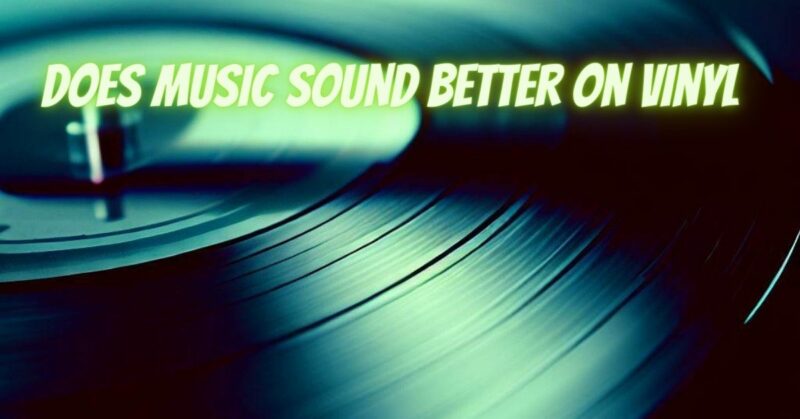The debate over whether music sounds better on vinyl records compared to digital formats has been a topic of passionate discussion among audiophiles and music enthusiasts for decades. Vinyl records have experienced a resurgence in popularity, appealing to both nostalgic collectors and new generations seeking a unique audio experience. In this article, we will explore the characteristics of vinyl records, the factors influencing perceived sound quality, and the subjective nature of music appreciation.
The Vinyl Listening Experience
Listening to music on vinyl offers a unique and tangible experience. The larger album covers, the physical act of handling the record, and the anticipation of the needle hitting the grooves create a sense of ritual that is distinct from digital playback. Vinyl records also offer analog sound, which some audiophiles argue provides a warmer, more organic sound compared to digital reproduction.
Analog vs. Digital Sound
The fundamental difference between vinyl and digital music lies in the way sound is captured and reproduced. Vinyl records use an analog format, where sound waves are physically imprinted onto the vinyl grooves. On the other hand, digital music relies on sampling and converting sound waves into binary code (0s and 1s) for storage and playback.
Proponents of vinyl argue that analog sound provides a more natural representation of the original recording, capturing subtle nuances and imperfections that may be lost in the digital conversion process. Some listeners claim that vinyl offers a warmer, more authentic sound with a richer and fuller dynamic range.
Factors Influencing Sound Quality
- Equipment Quality: The playback equipment, including the turntable, cartridge, and speakers, significantly impacts the sound quality of vinyl records. High-quality, well-maintained equipment can maximize the potential of vinyl sound.
- Vinyl Quality: The manufacturing process and quality of the vinyl record itself play a crucial role. High-quality vinyl pressings, handled and stored properly, can yield better sound reproduction.
- Mastering and Production: The mastering process for vinyl can differ from digital mastering, affecting the final sound. Some albums are specifically mastered for vinyl to optimize the analog format.
Subjective Nature of Music Appreciation
The perception of music quality is subjective and varies from person to person. While vinyl enthusiasts argue that the format provides a superior listening experience, others may prefer the convenience and consistency of digital music. Modern digital formats, such as lossless audio codecs, offer high-fidelity sound and can be indistinguishable from vinyl to many listeners, especially when played on high-end audio equipment.
Nostalgia and the Vinyl Resurgence
Nostalgia plays a significant role in the resurgence of vinyl records. Collectors and younger generations seeking a vintage experience are drawn to vinyl’s tangible nature and the charm of older music formats. Additionally, vinyl records often come with special edition artwork and bonus features, making them attractive to music enthusiasts and collectors alike.
The debate over whether music sounds better on vinyl is subjective and multifaceted. Vinyl records offer a unique and tangible listening experience, with some audiophiles praising the warm and authentic sound of analog reproduction. However, the perceived superiority of vinyl over digital formats largely depends on individual preferences, the quality of equipment, and the mastering process.
Ultimately, the enjoyment of music is a personal experience, and the choice between vinyl and digital music should be based on what brings the most satisfaction and pleasure to each listener. Whether one prefers the nostalgic charm of vinyl or the convenience of digital music, what truly matters is the joy and connection music brings to our lives.


